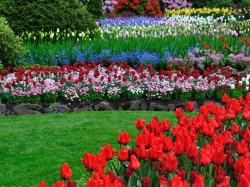National Garden Bureau Announces Grant For Therapeutic Gardens
May 15, 2015 | 3 min to read

CHICAGO – National Garden Bureau, in an ongoing effort (#growingforfutures) to raise awareness of horticulture and support the benefits of gardening, will grant $10,000 this fall to be split among three therapeutic gardens in North America.
After fundraising for a vocational therapeutic garden in Chicago last year, the National Garden Bureau (NGB) is expanding its support of gardens that promote the health and healing powers of human interaction with plants. Beginning this month, NGB will begin accepting applications from therapeutic gardens that meet the following set of criteria:
- Have a defined program using the garden to further particular goals for participants lead by a qualified leader. Examples include horticultural therapy, occupational, physical, vocational or rehabilitation therapy in a garden setting or using gardening to promote positive social relationships within a community.
- Offer a nature experience/interface for population served, including, but not limited to veterans, special-needs children or young adults, the elderly and/or those recuperating from specific injuries or addictions.
- Be used for job-training, skill-building, or food growing for at-risk youth, veterans, or the elderly.
- Involve a large number of gardeners, clients, patients, visitors or students on a monthly basis.
From all the applications received, a group of horticulture therapy experts will narrow all applications down to three finalists. Those three finalists will then be asked to submit a one-minute video that will be posted on www.ngb.org. All involved parties will solicit feedback from the public, using Social Media, to vote on the garden they wish to receive the grants. The top vote-getter will receive $5,000, second place will receive $3,000 and third place $2,000.
The panel of experts to determine the three garden finalists are:
- Patty Cassidy, Registered Horticultural Therapist, American Horticultural Therapy Association board member and secretary
- Barbara Kreski, Director, Horticultural Therapy Services, Chicago Botanic Garden
- Julie Tracy, President, Julie+Michael Tracy Family Foundation/Growing Solutions Farm
- Claire Watson, President, National Garden Bureau, Marketing Manager, PanAmerican Seed
To apply, therapeutic garden applicants should determine that they meet the criteria as outlined in this downloadable document and then complete this application and submit it to the NGB office by the deadline of July 15, 2015.
“We are looking forward to being able to support the therapeutic gardening efforts that are being created to help people rehabilitate from difficult situations. We encourage groups, however small, to participate for the chance to win a substantial contribution for their projects. Enter now!” encourages Claire Watson, National Garden Bureau President.
According to the American Horticultural Therapy Association, horticultural therapy (HT) is a time-proven practice. The therapeutic benefits of garden environments have been documented since ancient times. In the 19th century, Dr. Benjamin Rush, a signer of the Declaration of Independence and recognized as the "Father of American Psychiatry," was first to document the positive effect working in the garden had on individuals with mental illness.
HT techniques are employed to assist participants to learn new skills or regain those that are lost. A therapeutic garden is a plant-dominated environment purposefully designed to facilitate interaction with the healing elements of nature. There are many sub-types of therapeutic gardens including healing gardens, enabling gardens, rehabilitation gardens, and restorative gardens.
For more information about this project or the National Garden Bureau, visit: www.ngb.org and follow #growingforfutures on Social Media.
###
The National Garden Bureau is a non-profit organization in the horticulture industry with main offices in Downers Grove, Ill. Its mission is to raise awareness, provide education and increase the use of flowers and plants among gardeners and non-gardeners. For more information: www.ngb.org
Source: The National Garden Bureau
